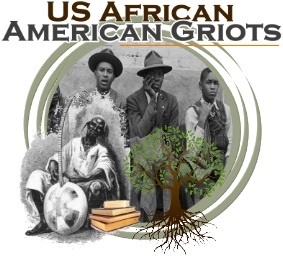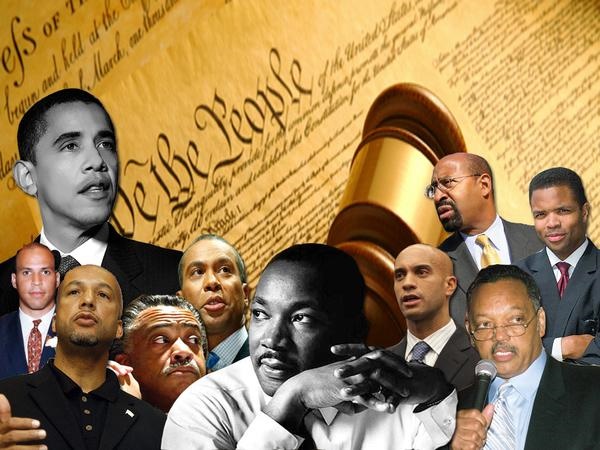Harrison
County, Indiana Newspaper Clippings
Contributed by Marsha
Belty
April 2005
|
|
FROM REPUBLICANS
O
Thursday, June 9 and 10, 1870
From: Republicans O
Thursday, June 9 &10, 1870
Pursuant to notice the colored people of Harrison
county, to the number of about two hundred
assembled at the grove one fourth mile east
of Corydon, last Thursday for the purpose of
celebrating the ratification of the 15th
amendment. Previous however, to repairing to
the grove, the colored people assembled at
their church in this place, formed into a procession,
and paraded the principal streets of
town, led by the Excelsior Brass Band, which
discoursed excellent music for the occasion.
The Procession was on foot, horseback and in
wagons. One wagon contained several little
girls dressed in uniform, with Betty
Perry representing
the Goddess of Liberty. After parading the
principal streets, the procession marched to
the grove. About 11 o'clock a delegation
from the country, headed by Littleton
Mitchell as marshall, and preceded by a
band, playing martial music, arrived and
after marching through the principal streets
also repaired to the grove. In a wagon in
this procession were several little boys
carrying a Bible, the Constitution of United
States, hammers, planes, saws, rakes, etc.,
representing religious, political,
mechanical and agricultural associations. At
the grove addresses were delivered by Dr.
Littleton Mitchem, Rev. J. W. Malone and Dr.
D. W. Voyles. Everything seemed to pass off
pleasantly and quietly and the colored
people seemed to enjoy the occasion very
much. A great many white persons were in
attendance both ladies and gentlemen and of
both political parties.
|
|
1897 First Commencement of
the
Corydon Black High School - Four Graduates
In 18__ venerable old man and his devoted
wife, becoming dissatisfied with the life of a
North Carolina plantation, concluded that their
duty is God and humanity would be the liberation
of their slaves. Not wanting them to fall into
the hands of the liberation of other slave
owners, but to have homes of their own, and
knowing of the government land open for
homesteading to Indiana, also the Christian
spirit and liberties that prevailed here at that
time, concluded to lead them West
to take claims for each family. After giving
them free papers, he decided to live among them
so as to enjoy the freedom of their conscience
and the latter part of their lives and be their
protectors.
Having laid their plans and disposed of their
plantation, Mr. Mitchum called his slaves
together, 107 in number, and gave each one his
and her task to perform on the pilgrimage to the
land of promise.
After making all necessary arrangements, those
two sainted old persons are seen day after
daymounted at the head of this singular caravan,
leading it as Moses led the Isralites, night
after night camping in the wilderness,
surrounded by wolves and other wild beasts.
After months of travel they reached Charlestown,
Ind., where a few of the sojourners were left,
then on to Floyd Knobs where some more were
left, and ending the journey at Corydon with
Bright Mitchem, Littleton Mitchem, Mace Mitchem,
Mike Mitchem, Tom Mitchem, Harry Mitchem, George
Cousins, James Finley, Lewis Finley, James
Powell, Oswald Wright, John Welch, Joe Finley,
Solon Carter and their wives, for whom he
entered government land claims, he and his wife
living with first one family and then the other
until their death. Their place of burial is not
definitely know, but in two grave yards, one
located about four hundred yards southeast of
the residence of C. W. Thomas on the Laconia
pike, and the other on the old James Demoss
farm, now known as the Michael Baez farm, all of
our colored pioneers are buried except Uncle
Jimmie Powell, who was buried in Cedar Hill
cemetery.
From them the families of Lloyd Mitchem, Isaiah
Mitchem, James Mitchem, John Mitchem, Vance
Mitchem, Arthur Mitchem, Nathaniel Finley,
Josiah Finley, John Cousins, Green Powell,
William Powell, Andrew Powell and Eli Welch are
direct descendants.
Three years before the war of the rebellion
Leonard Carter, a descendant of a family at
Floyd Knobs, took up his abode at Corydon, where
he enlisted in the Union Army.
After the war a few more families were added to
the colored residents from Meade county,
Kentucky, namely the Perrys, Browns, Slithe,
Scotts, Parkers, Hardaways, Cooks (Ashton),
Lewises, Craycrofts, Johnsons, Stewards and
Walkers.
From the old pioneers and the settlers from
Kentucky we get the present colored population
and the great population and the greatest
problem to figure out is who is related and who
is not. As this is a year of having this article
has been abridged to save space, but I hope that
the reader will gain a few facts that has been
overlooked in speaking of the old pioneers of
Corydon.
|
Isaiah Mitchem
Interesting Historical Facts Connected With
His Long Life
Last week (March 8, 1920.) in Harrison County,
Indiana at his home about seven miles from
Corydon, death claimed Isaiah Mitchem who was
perhaps from a historical point of view the most
interesting colored citizen of Hooslerdom. Mr.
Mitchem who was eighty-eight years of age at the
time of his death, was the son of Dr. Mitchem.
In the year 1814 Dr. Littleton Mitchem in
company with seventy-five servants, all owned by
Paul Mitchem, an abolitionist, were brought to
Indiana Territory and settled at Mauchport by
their master. Dr. Littleton Mitchem with the
seventy-five slaves were set free in that year
by their owner who served as a director for the
educational and industrial improvement of the
freed colony until 1824 at which time he died at
the remarkable age of 110 years. Paul Mitchem,
declared to do all in his power to atone
for the outrages of slavery sought to secure one
William Vincent, also white to direct the life
of the freed colony after his (Paul's) death,
but the refusal of Mr. Vincent to take upon
himself that responsibility left the free men to
look after themselves.
Being among the earliest pioneers of the state
one shouldn't wonder that the Mitchems of
Harrison county were at one time of proprietors
of considerable property.
Thirty-three years before freedom was declared
Isaiah Mitchem was born a free person in
Indiana. At the time of his death he was the
owner of a 90 acre farm on which he spent by far
6the greater part of his life with his first and
second wives and children.
In good manners and courtesy it may be said of
the deceased that he possessed a quality that
had no trace of slavery but still a quality that
won for him the respect of the entire
neighborhood which was practically the whole of
Harrison County. His language reflected his
eighty-eight years of freedom. It was but little
provincial. Mr. Mitchem's home which stands
along the rural highway, for many years has
served as a museum for the hundreds of visitors
who found their way to the homestead. It seemed
to have been a singular habit of Mr. Mitchem to
acquire relics. His collection had been gathered
from man States of the Union and from foreign
countries.
For more than thirty years the deceased was a
Christian. His devotion to a Christian
life led him a few moments before he died to
sing beautiful hymns, namely - "Nearer My God To
Thee" and "I Do Believe". The songs finished -
with hands stretched forth as if to welcome, he
uttered his last word, "Lord." There's no doubt
that Heaven welcomed his spirit Home.
To mourn his love the deceased leaves a wife.
Mrs. Mary Mitchem: daughters:--Mrs. Mary C.
Jackson, of Louisville, Ky., Mrs. Lovelorn
Cobin, Mrs. Ellen Skinner, Mrs. M. N. Bray of
Louisville, Ky., sons:-Alexander Mitchem, James
Mitchem, (of Indianapolis), Shadrach Mitchem,
John R. Mitchem, (of Pueblo, Col.) Whitman
Mitchem, (of Detroit, Mich.): brother Jasper
Mitchem; eight grandchildren, ten great
grandchildren and a host of friends. All the
near relatives were present at the funeral
except the son who lives in Colorado.
Funeral services, which were well attended by
both white and black, were conducted at the home
by Rev. M. C. Patterson, a white minister. Mrs.
Minnie E. Donahue conducted the music. Interment
was on the homestead land.
In the death of Mr. Mitchem the county has lost
a very worthy gentleman and worthy citizen.
|
|
Blacks celebrate
the right to vote
One outstanding event blacks in Harrison County
took place in June. 1870 with a big celebration
of the anniversary of the 15th Amendment. Over
200 blacks assembled at their church in Corydon
and, after an appropriate service, they were led
by the Excelsior Brass Band and paraded through
the streets to a grove one quarter mile east of
Corydon where a fine program was held. One of
the principal speakers was the county's own Dr.
Mitchum.
|
Corydon's Public
School for Blacks
This annex was added to the Corydon Grade School
in the fall of 1953. Two divisions of the first
grade are in this building.The annex, which was
formally the Corydon Colored High School, is
located on the North hill just about a square
east of Bethel A. M. E. Church. It is a large
two-room frame building and is built on a high
foundation of stone with a two-door entrance on
the west side. It has a wide hall, with
reasonable length. In this hall are places for
boys and girls wraps, a drinking fountain, and
two benches.There are two rooms separated by a
sliding partition running north and south in the
building to the hall that extends from the west
entrance in the second room on the east of the
building.There are 69 pupils in this building.
They all come on busses from outside of Corydon,
with the exception of pupils east of Maple and
north of Chestnut. The teachers are Mrs.
Stanley Windell and Mrs. Carl Bickel. |
Neighborly act
for Polly Ann Mitchem
On February 2, twenty
neighbors and friends headed by Rev. Jesse Shuck
and Ora Wiseman gathered at the home of Aunt
Polly Mitchem and gave her a "wood
choppin." Aunt Polly is past ninety and is
cutting teeth and she wishes to thank all for
thier kindness. Those present were: Rev. Jesse
Shuck, Boyd Wiseman, Jesse L. Wiseman, Ray
Keller, Albert Keller, Albert Deabm George
Keller Jr., Ben Keller, G. Seipel, M. Dooley,
John M. Dooley, John Snyder, Gay Gordon, Charlie
Shewmaker, Wylle Rhodes, Ambrose Parker, Willie
Kitterman and C. Rosenbarger.
|
Corydon
woman plans
to restore historic Summit Street School
Corydon's Maxine F. Brown announced plans
Monday to purchase the historic Summit Street
School (once called the "Colored School") at the
corner of Summit and Hill streets from A. B.
Haggard Jr. The school
will be restored, nominated for the National
Register of Historic Places, and renamed in
memory of Brown's aunt, Leora Brown Farrow, a
black teacher who taught at the school for many
years. Farrow died Friday at age 82 (see page
eight). The school will
be called the Leora Brown School and will be
used as a historic site and cultural center,
Brown said. "It is believed that the school is
the oldest standing black school in the state of
Indiana," Brown said. School records show that
bids were opened for construction of the school
on June 22, 1891. Farrow
taught black elementary students until the
1950-51 school year when the decision was made
to close the school. For several years
afterward, the school was used to provide
additional classroom space for the Corydon Grade
School and also for the Harrison County Special
Education Co-op program. The South Harrison
Community School Corp. sold the Summit Street
School and the old Corydon Junior High School
building to Haggard in the fall of 1986.
|
|


